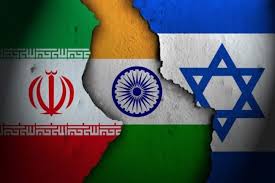Geopolitical Uncertainty and Oil Dependency
As tensions in the Middle East escalate, particularly with the ongoing conflict between Iran and Israel, the implications for India are profound and multifaceted. The intensifying conflict has raised fears of a full-scale regional crisis that could drastically affect global crude oil prices. Given India’s heavy reliance on oil imports, which account for about 80% of its total consumption, any disruption in this vital supply chain poses a significant risk to the Indian economy.
Oil prices have surged recently, with Brent crude approaching $75 a barrel, marking the third consecutive day of increases. This uptick in oil prices is particularly concerning for Indian policymakers, as higher crude prices could trigger inflationary pressures, complicating the Reserve Bank of India’s (RBI) monetary policy strategy. The potential for sustained high oil prices might compel the RBI to reconsider its previous plans for interest rate cuts, thus impacting economic growth and investor sentiment across the country.
Investor Sentiment and Market Reactions
The direct consequences of these geopolitical tensions have already been felt in Indian financial markets. On October 3, the benchmark indices, including the Sensex and the Nifty, opened lower, reflecting investor anxiety over the conflict’s escalation. Market experts caution that if the situation continues to deteriorate, global investors may shift their focus away from Indian equities—currently among the world’s best-performing markets—to safer assets like bonds or gold.
This shift could be exacerbated by the fact that Indian stocks are already trading at premium valuations. A prolonged conflict in the Middle East could lead to a significant recalibration of investor risk appetites, potentially causing capital flight from the Indian market. This could further undermine the confidence that has driven substantial foreign portfolio investment (FPI) inflows, which have surpassed ₹1 lakh crore this year.
Historically, geopolitical tensions have a tendency to induce volatility in financial markets, and investors often seek to minimize this volatility by reallocating their portfolios toward more stable and less risky investments. The rising conflict could lead to a reversal of the current trend, wherein foreign investors reassess their strategies and begin withdrawing capital from the Indian market, thereby exacerbating market instability.
The Role of Domestic Investors
Despite the looming threats from foreign capital withdrawal, it’s important to note that domestic investors have historically played a stabilizing role during periods of foreign exit. Whenever foreign investment flows diminish, domestic inflows often offset potential declines, helping maintain market stability. This dynamic may prove crucial as the Indian market navigates the uncertainties stemming from the Middle East crisis.
The Rising Tide of Gold Prices
Amidst these challenges, gold prices have soared, outperforming all other asset classes. This surge can be attributed to various factors, including a shift by central banks away from the dollar and increased demand from retail investors for jewelry. Gold’s ascent to record levels indicates that investors are seeking refuge in traditional safe havens in response to geopolitical uncertainties.
Interestingly, despite rising tensions in the Middle East, gold prices have shown limited reaction to recent developments. Strong labor data from the U.S. has tempered expectations for aggressive monetary easing by the Federal Reserve, which has implications for global gold markets and investor strategies.
Broader Economic Implications
The conflict between Iran and Israel is not just a regional issue but has potential global ramifications, particularly in trade and supply chain dynamics. If the conflict escalates further and draws in other major nations, the disruption of global trade flows could severely impact economic activities in India. The fear is that increased geopolitical risks may result in a tightening of global monetary policies, which could stifle economic recovery efforts.
The recent decisions by major central banks, including the U.S. Federal Reserve’s interest rate cuts, were initially seen as supportive measures for economic growth. However, the current geopolitical landscape, with its associated economic uncertainties, may force these central banks to rethink their strategies. If inflation rises due to higher oil prices and trade disruptions, we may see a shift back towards tightening monetary policies rather than the anticipated easing.
Navigating Uncertainties
The ongoing conflict in the Middle East has significant implications for India, particularly regarding its economic stability and investor sentiment. As oil prices rise and geopolitical uncertainties loom large, the RBI may find itself in a challenging position, needing to balance the need for economic growth with the pressures of inflation.
Indian policymakers and market participants must remain vigilant in the face of these developments, adapting strategies to mitigate the risks posed by external factors. As the situation unfolds, the interplay between geopolitical tensions and domestic economic policies will be critical in determining India’s economic trajectory in the coming months. The country’s ability to withstand these pressures will depend on maintaining investor confidence, fostering domestic investment, and navigating the complex global landscape shaped by conflicts in the Middle East.




